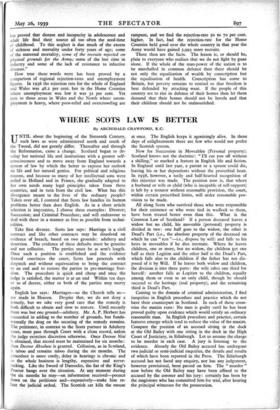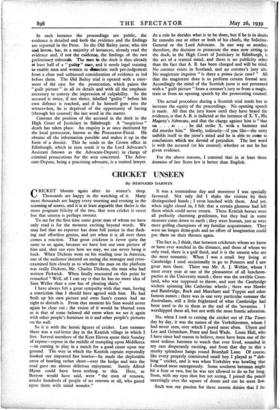WHERE SCOTS LAW IS BETTER
By ARCHIBALD CRAWFORD, K.C.
NTEL about the beginning of the Sixteenth Century, such laws as were administered north and south of the Tweed, did not greatly differ. Thereafter and through the Reformation, came a change. Scotland began to de- velop her national life and institutions with a greater self- consciousness and to move away from England towards a system of law by which the better to express her outlook on life and her natural genius. For political and religious reasons, and because so many of her intellectual sons were exiled in Holland and in France, she gradually adapted to her own needs many legal principles taken from these countries, and in turn from the civil law. What has this divergence meant to the lives of the ordinary people? Taken over all, I contend that Scots law handles its human problems better than does English. As in a short article selection is imperative, I choose three examples: Divorce; Succession; and Criminal Procedure; and will endeavour to deal with these in a manner as free as possible from techni- calities.
Take first divorce. Scots law says: Marriage is a civil contract and like other contracts may be dissolved on evidence of breach, based on two grounds: adultery and desertion. The evidence of these defaults must be genuine and not collusive. The parties must be at arm's length. Once such a position is established and the evidence thereof convinces the court, Scots law proceeds with despatch and without equivocation to bring the contract to an end and to restore the parties to pre-marriage free- dom. The procedure is quick and cheap and once the judge is satisfied, the matter is at an end Within ten days or so of decree, either or both of the parties may marry again.
English law says: Marriages—so the Church tells us— are made in Heaven. Despite that, we do not deny a remedy, but we take very good care that the remedy is both difficult to obtain and slow to mature. Until recently there was but one ground—adultery. Mr. A. P. Herbert has succeeded in adding to the number of grounds, but funda- mentally the drag on the securing of the remedy remains. The petitioner, in contrast to the Scots pursuer in Adultery cases, must pass through Court with a clean record, unless the judge exercises discretion otherwise. Once Decree Nisi is obtained, that record must be maintained for six months: then Decree Absolute is granted. Collusion, as in Scotland, is taboo and remains taboo during the six months. The procedure is more costly, delay in hearings is chronic and :03 the whole business is lengthy, expensive and nerve- racking. Like the Sword of Damocles, the fiat of the King's Proctor hangs over the situation. At any moment during the six months he may—on information received—pounce down on the petitioner and—expensively--make him re- face the judicial ordeal. The Scottish cat kills the mouse at once. The English keeps it agonisingly alive. In these days of enlightenment there are few who would not prefer the Scottish system.
Now for Succession in Moveables (Personal property). Scotland knows not the doctrine: "I'll cut you off without a shilling," so marked a feature in English life and fiction. In England until last year, a parent or a spouse could die, leaving his or her dependents without the proverbial bean. In 1938, however, a tardy and half-hearted recognition of this injustice was made. The position now is, that where a husband or wife or child (who is incapable of self-support) is left by a testator without reasonable provision, the court, within certain prescribed limits, will order reasonable pro- vision to be made.
All along Scots who survived those who were responsible for their existence or who were tied in wedlock to them, have been treated better even than this. What is the Common Law of Scotland? If a person deceased leaves a widow but no child, his moveable (personal) property is divided in two: one half goes to the widow, the other is Dead's Part (i.e., the absolute property of the deceased on which he can "test "—i.e., dispose by will) and falls to his heirs in moveables if he dies intestate. Where he leaves children, one or more, but no widow, the children get one half as their Legitim and the other half is the Dead's Part, which falls also to the children if the father has not dis- posed of it by Will. If he leaves both widow and children, the division is into three parts: the wife takes one third for herself: another falls as Legitim to the children, equally among them or even to an only child, though he should succeed to the heritage (real property), and the remaining third is Dead's Part.
Coming to the domain of criminal administration, I find inequities in English procedure and practice which do not have their counterpart in Scotland. In each of these coun- tries the maxim runs: No man is guilty until he has been proved guilty upon evidence which would satisfy an ordinary reasonable man. In English procedure and practice, certain features emerge which tend to reduce the value of the maxim. Compare the position of an accused sitting in the dock at the Old Bailey with one sitting in the dock in the High Court of Justiciary, in Edinburgh. Let us assume the charge to be murder in each case. A jury is listening to the evidence. Already the Old Bailey accused has undergone two judicial or semi-judicial enquiries, the details and results of which have been reported in the Press. The Edinburgh accused has not faced any enquiry, nor has any judgement, however provisional, been passed on him. The " murder " now before the Old Bailey may have been affixed to the accused by the coroner and his jury: certainly has been by the magistrate who has committed him for trial, after hearing the principal witnesses for the prosecution. In each instance the proceedings are public, the evidence is detailed and both the evidence and the findings are reported in the Press. So the Old Bailey juror, who sits and listens, has, in a majority of instances, already read the evidence and, if not the evidence, the findings of the two preliminary tribunal& The man in the dock is thus already at least half of a " guilty " man, and it needs legal training to enable men and women to disociate such pre-judgement from a clear and unbiassed consideration of evidence as led before them. The Old Bailey trial is opened with a state- ment of the case for the prosecution, which paints the "guilt picture" in all its details and with all the emphasis necessary to convey the impression of culpability. So the accused is twice, if not thrice, labelled "guilty" before his own defence is reached, and if he himself goes into the witness-box, he is deprived of the opportunity of having (through his counsel) the last word in the matter.
Contrast the position of the accused in the dock in the High Court of Justiciary in Edinburgh. A "suspicious" death has taken place. An enquiry is at once instituted by the local prosecutor, known as the Procurator-Fiscal. He obtains all the information possible and makes it up in the form of a dossier. This he sends to the Crown office in Edinburgh, which in turn sends it to the Lord Advocate's Assistant (known as the Advocate-Depute) in charge of criminal prosecutions for the area concerned. The Advo- cate-Depute, being a practising advocate, is a trained lawyer. As a rule he decides what is to be done, but if he is in doubt he consults one or other or both of his chiefs, the Solicitor- General or the Lord Advocate. In one way or another, therefore, the decision to prosecute the man now sitting in the dock, in the High Court of Justiciary in Edinburgh, is the act of a trained mind, and there is no publicity other than the fact that A. B. has been charged and will be tried. No coroner exists in Scotland, and no coroner's jury sits. No magistrate inquires "is there a prima facie case?" All that the magistrate does is to perform certain formal acts. Accordingly the mind of the Scottish juror is not presented with a "guilt picture "from a coroner's jury or from a magis- trate or from an opening speech by the prosecuting counsel.
The actual procedure during a Scottish trial tends but to increase the equity of the proceedings. No opening speech is made. All that the jury know until they have heard the evidence, is that A. B. is indicted at the instance of X. Y., His Majesty's Advocate, and that the charge against him is " that on . . . at . . . he did strike X. with a hammer and did murder him." Slowly, tediously—if you like—the story unfolds itself to the juror's mind and he is able to come to conclusions which are devoid of prejudice. The last word is with the accused (or his counsel) whether or not he has given evidence.
For the above reasons, I contend that in at least three domains of law Scots law is better than English.



























































 Previous page
Previous page